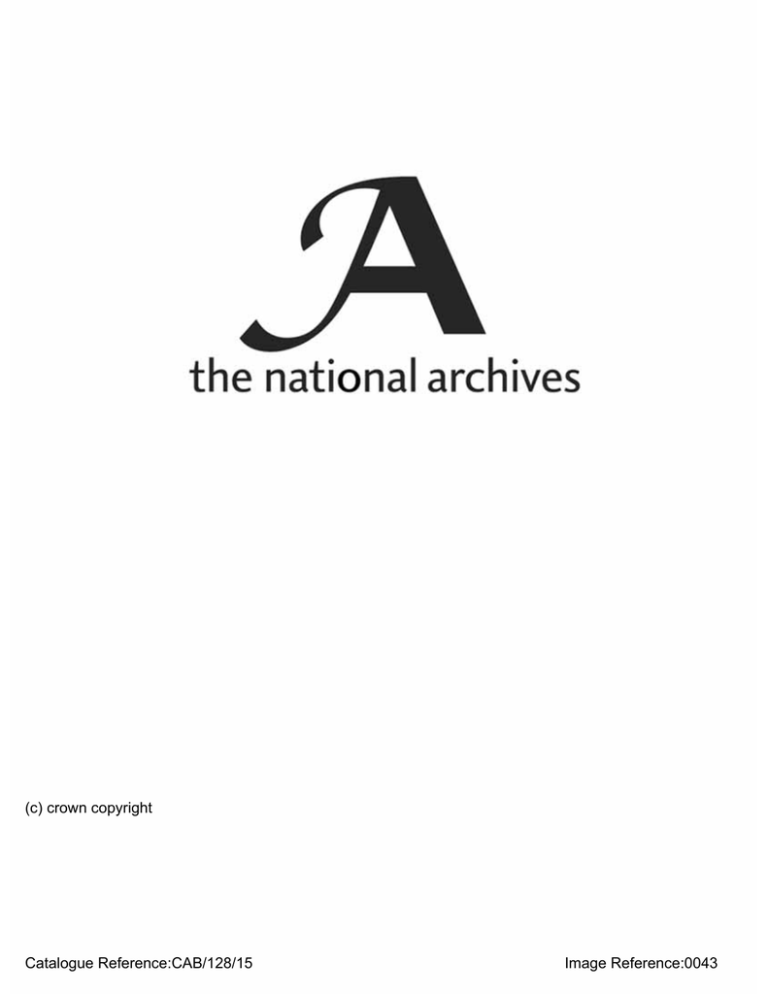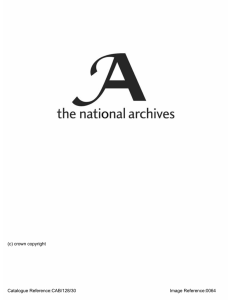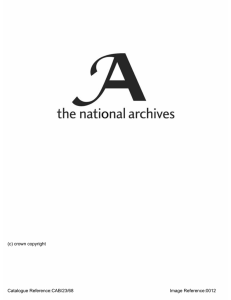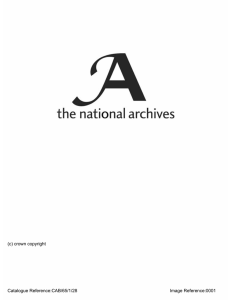(c) crown copyright Catalogue Reference:CAB/128/15 Image Reference:0043
advertisement

(c) crown copyright Catalogue Reference:CAB/128/15 Image Reference:0043 THIS DOCUMENT IS THE PROPERTY OF H I S BRITANNIC Printed for the Cabinet. MAJESTY'S GOVERNMENT June 1949 SECRET Copy No. C M . (49) 43rd Conclusions CABINET 43 (49) CONCLUSIONS of a Meeting of the Cabinet held at 10 Downing Street, S.W. 1, on Thursday, 30th June, 1949, at 10 a,m. Present The Right Hon. C. R. ATTLEE, M . P Prime Minister (in the Chair'). The Right Hon. HERBERT MORRISON, The Right Hon. ERNEST BEVIN, M.P., Secretary of State for Foreign M . P . , Lord President of the Council. Affairs. The Right Hon. A . V. ALEXANDER, The Right Hon. HUGH DALTON, M.P., M.P., Minister of Defence. Chancellor of the Duchy of Lancaster. The Right Hon. VISCOUNT ADDISON, The Right Hon. VISCOUNT JOWITT, Lord Privy Seal. Lord Chancellor. The Right Hon. J . CHUTER E D E , M.P., The Right Hon. A. CREECH JONES, Secretary of State for the Home M.P., Secretary of State for the Department. "Colonies. The Right Hon. P . J . NOEL-BAKER, t h e Right Hon. A. WOODBURN, M.P., M.P., Secretary of State for Secretary of State for Scotland. Commonwealth Relations. The Right Hon. G . A . ISAACS, M.P., The Right Hon. ANEURIN BEVAN, M.P., Minister of Health. Minister of Labour and National Service. The Right Hon. T. WILLIAMS, M.P., The Right Hon. GEORGE TOMLINSON, M.P.. Minister of Education. and Minister of Agriculture Eisheries. The Right Hon. J . H . WILSON, M.P., President of the Board of Trade. The following were also present: The Right Hon. ALFRED BARNES, M.P., The Right Hon. JAMES GRIFFITHS, M.P., Minister of National Insurance M.P., Minister of Transport (Item 6) (Item 8). The Right Hon. WILFRED PALING, The Right Hon. H . A. MARQUAND, M.P., Minister of Pensions (Item 8). M.P., Postmaster-General (Item 6). The Right Hon. Sir FRANK SOSKICE, The Right Hon. WILLIAM WHITELEY, M.P., Parliamentary Secretary, K.C., M.P., Solicitor-General (Items Treasury (Items 1-5). 5-7). The Right Hon. W . G. HALL, M.P., Financial Secretary, Treasury (Items 2-6). Secretariat : Sir NORMAN BROOK. Mr. A. JOHNSTON. Mr. 37256 S. E. V . LUKE.' B C A B I N E T 43 (49) CONTENTS Minute No. 1 Parliament Subject Business in the House of Commons. 2 India Pensions for Members of Civil Services. 3 4 General Election Industrial Disputes Dockers' Strikes. Railway Dispute. 5 Parliament Offices of Profit. 6 7 8 Civil Servants and Industrial Disputes Anglo-Norwegian Fisheries Dispute Social Services in "Western Europe .... 85 Parliament. Business in the House of Commons. C M . 43 (49) 1. The Cabinet were informed of the business to be taken in the House of Commons in the following week. The Analgesia Bill was due to come forward on Report on the following day. The Bill had been substantially amended in Committee, and Government supporters would raise the question whether this was the same Bill which had received a Second Reading. Even if this point of order was not successful, the Bill might be talked out. A short discussion followed on the time-table for the remaining stages of the Iron and Steel Bill. The Bill was expected to get a Third Reading in the Lords on 20th July, and exchanges would then take place between the two Houses on the amendments introduced into the Bill in the Lords. These would take some days, and the Government might be faced with the alternatives of adjourning until after the Summer Recess the attempt to find some basis of agreement between the two Houses, or asking Parliament to continue to sit for a few days after the end of July. There was general agreement that, if this situation should arise, the preferable course would be to defer until the autumn the completion of the discussions between the two Houses on the Lords' amendments. 2. The Cabinet were informed that a. debate was to take place in the House of Lords on 6th July, on a motion by Earl Wavell, Pensions for about the pension rights of certain European members of Civil Members of Civil Services. Services in India and Pakistan which had not been under the control of the Secretary of State for India. I n November 1948 the Govern­ (Previous ments of India and Pakistan had agreed that European members of Eef erence: those Services might be allowed to retire on proportionate pension; C.M.(47)36th but this agreement did not apply retrospectively and did not, Conclusions, therefore, cover certain members who had already retired between Minute 2.) the date of the transfer of power and the date of the agreement. Lord Wavell was now urging that the United Kingdom Government should provide pensions for these men. This demand would find widespread support in the House of Lords, and it would be difficult to resist it. The numbers concerned were small, and they had strong claims to compassionate consideration. I t was the view of the Cabinet that no further attempt should be made to persuade the Governments of India and Pakistan to provide pensions for these men; but that further consideration should be given to the possibility of making some provision for them from United Kingdom funds. The C a b i n e t Invited the. Lord Privy Seal to take this question up with the Chancellor of the Exchequer and the Secretary of State for Commonwealth Relations, before the debate in the House of Lords on 6th July, with a view to seeing whether some provision could not be made from United Kingdom - funds for the small number of Europeans who had resigned from these Services during the period between the transfer of power and the agreement of November 1948. India. 3. The Prime Minister said that it was desirable that the -Press should not be encouraged to speculate about the date of the General Election. He asked all Ministers to be careful to avoid saying anything, in speeches or on other occasions when they might be reported, which might be taken to imply that they were aware of the date on which the Election would be held. If forced to say something on this subject, Ministers should take the line that the 37256 B 2 General Election. . 170 Election might be held at any time during the course of the next twelve months, but should not say anything to indicate what period would be most likely. Industrial Disputes. (Previous Reference: C.M.(49)41st Conclusions, Minute 1.) Dockers' Strikes. Railway Dispute. 4. The Cabinet were informed of further developments in the strike of stevedores in the London docks. Earlier in the week there had been good reason to hope that the stevedores would decide to return to work; but, owing mainly to an announcement by the employers that labour would not be assigned to other ships until the two Canadian ships were unloaded, the strike still continued in the Surrey and Royal Albert Docks. For the present, no special action need be taken to unload perishable cargoes; but the Emergencies Committee would continue to watch the position. The Cabinet were informed of the course of events leading to the decision of the National Union of Railwaymen to order a go s l o w " campaign throughout the railway system from 3rd July. Representatives of the railway unions were meeting the Railway Executive Committee that afternoon, and negotiations were proceeding. The C a b i n e t Took note of these statements. Parliament. Offices of Profit. (Previous Reference: CM. (46) 18th Conclusions, Minute 9.) 5. The Cabinet considered a memorandum by the Lord President and the Home Secretary ( C P : (49) 142) explaining that it had been brought to notice that Mr. J. B. Hynd, M.P., who was recently appointed a member of the General Medical Council, and Mr. J. J . Robertson, M.P., who had previously been a member, might have prejudiced their position as Members of Parliament by reason of section 24 of the Succession to the Crown Act, 1707. Mr. Albert Evans, M.P., had also jeopardised his position by reason of small sales of electrical equipment to the Home Office by a.firm in which he held a partnership. I t was proposed to introduce an Indemnifying Bill in respect of these three Members of Parliament. The Lord President explained that Members of the House of Commons had served on the General Medical Council since 1926 and no difficulty had been raised until the appointment of Mr. Hynd, when a member of the Council had suggested that he was not qualified to serve. The question had now been raised whether indemnities would be required in respect of Mr. J . Diamond, M.P., who was appointed to the General Nursing Council in 1948, and Mr. W. M. Snadden, M.P., and Mr. P . H. Collick, M.P., who were appointed members of the Council of the Royal College of Veterinary Surgeons in the present year. All these examples drew attention once more to the vague and unsatisfactory nature of the law relating to offices of profit, and it seemed to be desirable that a general investigation into the modernisation of the law, which the Lord P r e s i d e n t s Committee had instituted in 1946, should now be resumed and brought to a conclusion. In subsequent discussion the following points were made :— (a) I t was a matter for argument whether membership of the General Nursing Council and of the Council of the Royal College of Veterinary Surgeons should be regarded as an office of profit under the Crown. Members of these bodies were entitled to subsistence allowances, and earlier Law Officers had advised that in the ordinary way a subsistence allowance could not be regarded as yielding profit. The test was not whether money passed but whether there was profit, or an expectation of profit. I t might be desirable in the Indemnifying Bill to cover the cases of Messrs. Diamond, Snadden and Collick, unless it appeared that this would cast doubt upon the position of other Members of Parliament holding rather similar appointments. (b) The Solicitor-General was reasonably satisfied that another Member of Parliament who had been concerned in the sale of aeroplane parts had not placed himself in danger since the transac­ tions had been conducted by a joint stock company. (c) A Select Committee of the House of Commons had made recommendations in 1941 about the law relating to offices of profit. This report had not, however, fully covered the field since it did not deal, for example, with Members of Parliament appointed to panels from which umpires were drawn under social service legislation. I t was arguable that the subject should be looked at afresh by a Select Committee, since it concerned the relations of the executive to the legislature. 0) The enquiry instituted by the Lord Presidents Committee in 1946 had reached the stage of the drafting of a Bill listing offices which disqualified for membership of the House of Commons and those which did not. I t had not been carried further at that time since it had been felt that many offices then existing were of a temporary character and would disappear when conditions became more normal. The Cabinet— (1) Agreed that an Indemnifying Bill should be introduced in respect of Mr. J . B. HyncTs and Mr. J. J. Robertson's membership of the General Medical Council and in respect of the transactions of Mr. Albert Evans, M.P., with the Home Office; and that, if necessary, the Bill might also cover Mr. J . Diamond, M.P., Mr. W. M. Snadden, M.P., and Mr. P. H. Collick, M.P. (2) Invited the Lord President to discuss with the Opposition the position of Members of the Opposition who had served on the General Medical Council before 1945. (3) Invited the Lord President to bring before the Lord Presidents Committee the general question of the steps to be taken to bring up to date the law relating to offices of profit. Civil Servants 6. The Cabinet had before them a memorandum by the Home and Industrial Secretary ( C P . (49) 143) raising the question whether, in the event Disputes. of a widespread strike, civil servants should be allowed to refuse to undertake work different from, though anaVgous to, that on which they were ordinarily employed, on the ground that by doing this work they would be taking sides in the dispute. The matter had arisen because the Emergencies Committee had been faced with the . problem whether, in the event of a railway strike, postmen who ordinarily conveyed mails in road vehicles over short distances could properly be required to carry long-distance mail by road, or to provide emergency transport'to carry telephonists to the exchanges at which they worked. The Postmaster-General explained that Post Office workers who were instructed during a railway strike to carry mail which in the ordinary way would have gone by rail would probably consider that they were being asked to act as blacklegs. In 1926 this matter had been the subject of prior negotiations and the then PostmasterGeneral had given the Union of Post Office Workers a written assurance that they would not be asked to undertake work different from that on which they were ordinarily employed. Extra duties which had fallen on the Post Office, in order to keep essential services going, had been performed by volunteers drawn from Post Office staffs and from outside. The Post Office workers would undoubtedly expect the precedent of 1926 to be followed in any future strike. I n discussion, it was suggested that the arrangements adopted in a general strike need not be regarded as applicable to a strike affecting a single service, such as the railways. The employment of volunters might cause as much friction as a request to Post Office workers to assist in keeping the Post Office services running. I t would be undesirable to approach the staff in advance of any stoppage and thereby suggest that it was for the staff to define what were properly the duties of Post Office workers in emergency conditions. I t seemed reasonable to expect Post Office workers to erform duties of the kind that had been mentioned in discussion, f from time to time arrangements could be made for mails to be carried by road over considerable distances, something might be done to break down the impression that these duties in time of emergency were highly exceptional. The C a b i n e t Agreed that, in the event of an industrial dispute, civil servants might be expected to undertake work different from, though analogous to, t h a t on which they were ordinarily employed, where this was necessary for the maintenance of essential services, and thaf the PostmasterGeneral should therefore proceed on the lines indicated in paragraph 4 (1) of C P . (49) 143. P AngloNorwegian Fisheries Dispute. (Previous Reference: CM. (49) 4th Conclusions, Minute 4.) 7. The Cabinet considered a memorandum by the Foreign Secretary ( C P . (49) 140) proposing t h a t the dispute with the Norwegian Government over the fishing limits claimed for the exclusive use of Norwegian fishermen should be referred to the International Court of Justice, unless agreement could be reached on a modus vivendi by the end of July. The Foreign Secretary said that efforts to reach a settlement of this dispute by negotiation had failed : the Norwegian Government had refused even to agree to an acceptable modus vivendi, and Norwegian fishery cruisers had arrested British vessels fishing in the disputed areas. When the Cabinet last discussed the question on 17th January, it had seemed possible that a settlement might be reached on the basis of a new line approximating closely to the boundary established by the modus mvendi of 1933. These hopes had, however, been frustrated by the inability of the Norwegian Government to persuade the Norwegian Parliament to modify their decision to bring into operation the Royal Decree of 1935, which prescribed limits for the Norwegian fisheries far more extensive than any that H i s Majesty's Government could accept. There was a serious risk that, if the present situation continued, there might be further incidents seriously prejudicial to Anglo-Norwegian relations. He therefore thought that the Norwegian Government should now be informed that, unless they were prepared -to accept our proposals for a modus vivendi by the end of July, we should refer the whole question to the International Court, if necessary by unilateral application. The C a b i n e t Approved the recommendation made in C P . (49) 140. Social Services in Western Europe. (Previous Reference: CM. (48) 35th Conclusions, Minute 9.) 8. The Cabinet considered a note by the Foreign Secretary ( C P . (49) 131) covering a report by the Official Committee on Social Services in Western Europe on the work done in the past year to give effect to Article I I of the Brussels Treaty. The Foreign Secretary said t h a t he thought that encouraging progress had so far been achieved in the development of co-operation between the Brussels Powers in the social field. He did not think it would be advisable to make any change at that stage in the machinery established under the Treaty for the discussion of social questions, though it would in due course be necessary to review its relation to any corresponding machinery which might be set up by the Council of Europe. He also recommended that the Official Committee should continue in existence in order to ensure the co-ordination of United Kingdom policy. The Cabinet were in general agreement with the Foreign Secretary's recommendations. I n further discussion the Minister of Health said that there was scope for more vigorous action in connection with the health services. I n this country foreign visitors or residents were entitled to benefit by the National Health Service, and we might reasonably press for reciprocal concessions by the other Brussels Powers. He would submit definite" proposals to the Foreign Secretary on this point. The C a b i n e t ­ (1) Approved the recommendations made in C P . (49) 131. (2) Invited the Foreign Secretary, in consultation with the Minister of Health, to consider what proposals might be submitted to the other Brussels Powers on the grant of reciprocal facilities for medical and dental treatment. Cabinet Office, S.W.1, ' 30th June, 1949.



